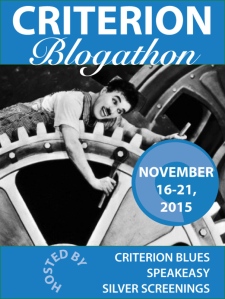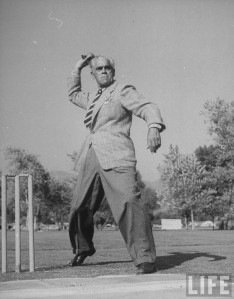In 1987 a gentle movie came out of Denmark and it happened to win the Best Foreign Language Film at that year’s Academy Awards. It won the BAFTA(British of Film and Television Arts) for Best Foreign Film, and it also won Best Film in Denmark, the Bodil and Robert Awards. I watched it in the late 1980s when it came out on video and I enjoyed it immensely. I’m referring to the film Babette’s Feast, and it’s my choice to write about for the Criterion Blogathon. Be sure to visit the Blogathon’s link to read about other wonderful movies that have been featured via Criterion, the American video-distribution company.
Babette’s Feast began it’s creative life as a short story written by Danish author Karen Blixen, who is most famously known for her autobiographical novel, Out of Africa. The film’s screenplay was written by Gabriel Axel, the late Danish actor, film director, and producer. Axel also directed the film, in a straightforward manner, with narration provided by actress Ghita Norby. Axel’s vision gives us the tale of simple people, who create a life appropriate for themselves, and with connecting lives and coincidences, serve one another, and show one another respect and love.
Babette’s Feast is set in the barren beauty of western Jutland. Now I’m an American and had no idea what Jutland meant, so when I recently re-watched the movie, I did an online search for Jutland. I found that it’s a peninsula shared by Denmark and Germany. The North Sea lies to its west, the Skagerrak to the north, the Kattegat and Baltic Sea lie to the east, and Germany on the south. When one of the character’s in the film is banished there for 3 months, he groans out his disappointment, “Jutland?” From what we are shown, it’s a flat land, with some hills, near the sea, no trees in sight, just lots of grasses and lots of wind.
It is to this geographic panorama we are sent, to a small village where everyone knows everyone. Two sisters, Martine and Philippa, are maiden ladies, senior citizens, who go about their lives in quiet routine. They visit the infirm and bring them meals, they host a weekly bible study attended by fellow senior citizens, they pay homage to their deceased father, the minister of the village, who named his only children after Martin Luther and Luther’s friend, Philip Melanchthon. To an outsider, their lives seem very dull. But to these two ladies, their lives are very full and they don’t ponder very much as to what their lives could have been.
The narrator then sends us back in time, via two flashbacks, to show that Martine and Philippa’s lives could have turned out so very different, if they had only followed their hearts. The first flashback is Martine’s: when she was a beautiful young woman she met by chance a handsome officer, Lorens Lowenhielm, who had been banished to Jutland for 3 months by his father due to many gambling debts. Lorens accepts his punishment glumly but when he meets Martine, he is immediately drawn to her and wants to get to know her. He attends her father’s church services, and the smaller bible study gatherings, that meet at Martine’s home. Martine’s father is not an overbearing type of man, but he does have a quiet charisma about him, and he has impressed on his daughters that they are his “right and left” hands, and that he can’t do without them, so when Lorens makes his final farewell to Martine, it is with sadness as he hasn’t been able to break down that barrier that exists between Martine and any possible suitor.
The second flashback is Philippa’s . Philippa is blessed with a beautiful singing voice and it is by coincidence that a French opera star, Achille Papin, needing a rest from his performances, agrees to a friend’s suggestion that he stay in Jutland, at the very village where Martine and Philippa live. Achille happens to be out on a Sunday morning walk and he hears a gorgeous voice among the others, singing a hymn in the church and he enters the building. He learns that the voice of the angel belongs to Philippa, and he contacts her father, offering to give Philippa voice lessons. The voice lessons begin and it’s evident to Achille and Philippa that she has a wonderful talent, that she too, could go on the stage and probably become an opera star. Achille is drawn to Philippa, especially when they sing a duet from a famous operatic love song. Alas, Philippa decides to stop the voice lessons and to stay in Jutland with her father and sister, and sadly, Achille goes back to Paris without his muse.
After the two sisters’ flashbacks, we are brought back to the present, which is 1871 and a knock on the sisters’ front door during a rainstorm. A stoic woman is standing on their threshhold, sopping wet. Martine and Philippa immediately usher this stranger into their home, give her a cup of hot tea, start to mop the water off of the woman’s face, when she hands them a letter. The letter is from Achille Papin, now retired. His letter is a plea for these ladies to take into their home, refugee from Paris, Babette Hersant. France has been undergoing a civil war and Babette’s husband and son were shot and killed and she herself had to go into hiding. Achille, an old family friend, remembered the two kind sisters in Jutland, would they take Babette into their home? Martine and Philippa agree, but explain to Babette that they can’t afford to pay a housekeeper or cook, and Babette explains that that is fine with her. Babette settles in to the Danish home, begins to learn the langugage, money rate exchange, and how to cook the meals the sisters prefer. All is quiet and peaceful for many years until the day Babette receives a telegram.
The telegram states that Babette has won the French lottery-$10,000 francs! Martine and Philippa are happy for Babette, who is happy and stunned by this win. The two sisters assume Babette will soon take her leave of them but no, that is not Babette’s plan. To show her servant’s heart, to show her thankfulness to the two sisters who took her in and gave her a home, to show that a true artist cannot live without doing their utmost to let their art shine, Babette uses her lottery winnings to make a masterpiece of a meal.
It is soon to be the anniversary of Martine and Philippa’s father’s 100th birthday and they had been planning a small party, inviting their fellow senior citizen church members. Babette begs them to let her make the meal for this party. With reluctance, and some worries when they see the rich and extravagant ingredients Babette has ordered from France(Wine!), the sisters warn their guests that they can’t be sure that what they eat and drink won’t be too decadent or sinful! Each of the guests agrees that they won’t utter one word of enjoyment as they partake in the meal. A last minute guest is added to the list, General Lorens Lowenhielm, Martine’s long ago suitor, who happens to be visiting his aged aunt who is on the guest list, so she sends word that her nephew will be attending, too.
What I like so much about Babette’s Feast: the locale of Jutland-it’s barren, yet it has a simplistic beauty and the people who live there are resilient. The romances of the two sisters, who turned down chances at love, which caused heartache for their two suitors. The coincidental link of Achille Papin finding Babette refuge with the two sisters. The silly stoicism of the dinner guests that they won’t comment on the fabulous meal;thank goodness for General Lorens, as he keeps praising each course and each wine selection. The wine, in fact, gets the grumpy seniors to stop their bickerings with each other, and friendships are renewed. I also like the fact that Pope Francis has said this is his favorite film!
The cast is outstanding, of course! Babette is played by French actress Stephan Audran, Birgitte Federspiel is Martine, Bodil Kjer is Philippa, Young Martine is Vibeke Hastrup, Young Philippa is Hanne Stensgaard, their father, known just as The Minister, is Pouel Kern, Young Officer Lorens Lowenhielm is Gudmar Kloving, General Lowenhielm is Jarl Kulle, Achille Papin is Jean-Philippe Lafont.
Of course to view the wonderful film, seek it out at The Criterion Collection!
An afterthought: I have a son training to be a chef. I called out to him the methods Babette used in creating her feast. The ingredients, the wines, the courses-he kept nodding his head as he has had some coursework on French cooking and how a meal there would be served, the courses, etc. As I watched the montages of Babette cooking, I kept marveling that this was all done without modern kitchen conveniences: no microwave oven, no convection oven, no double wall oven, no Kitchen Aid mixer, no blenders, no Cuisenart food choppers, no refrigerators or freezers! We modern day cooks have it easy!!!
Lastly, here’s the feast that Babette fixed: 1st Course: Potage a la Tortue(Turtle Soup) served with Amontillado sherry. 2nd Course: Blinis Demidoff (Buckwheat cakes with caviar and sour cream) served with Veuve Cliquot Champagne. 3rd Course: Cailles en Sarcophage (Quails in puff pastry with foie gras and truffle sauce) served with Clos de Vougeot Pinot Noir. 5th Course: Endive Salade. 6th Course: Savarin au Rhum avec des Figues et Fruit Glacee( Rum Cake with figs and candied cherries) served with champagne. 7th Course: Assorted cheeses and fruits served with sauterne. When the guests left the dinner table to congregate in the living room, Babette made sure they were served coffee and vieux marc Grand Champagne cognac.
































You must be logged in to post a comment.